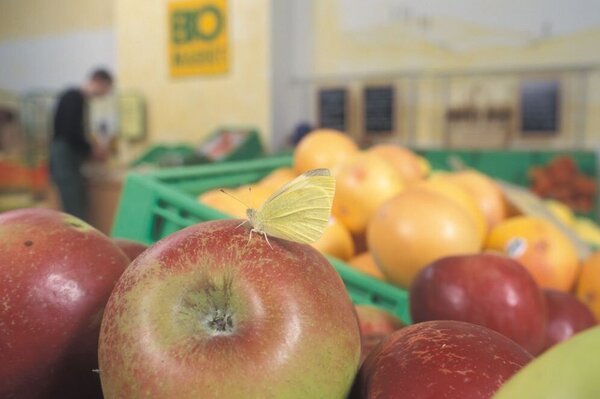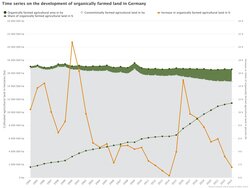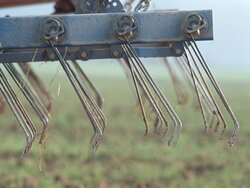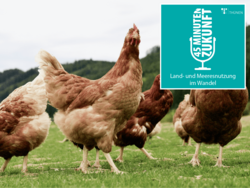Dossier
Current trends in the German organic sector
Heike Kuhnert | 18.08.2025
Organic farming has developed from a grassroots movement into a steadily growing sector within the agricultural and food industry – in Germany, the European Union and worldwide. Organic farming is regarded as a particularly sustainable production system and has therefore been financially supported by agri-environmental policy for more than 30 years. The European Union, Germany and many other countries are politically endeavouring to expand organic farming.
Where organics stand in 2024
In 2023, every seventh farm in Germany operated organically, a total of 35,881 organic farms. This corresponds to 14,1 percent of all German farms. The organically farmed agricultural area now covers about 1.91 million hectares, 11.5 percent of the agricultural area in Germany. Compared to 2023, the organically farmed area grew by 24.213 hectares, which corresponds to just 1,3 percent.
The market volume of organic food in 2024 amounts to 16.99 billion euros and includes sales in food retail, natural food retail and other shopping outlets, which include drugstores, health food shops, farm shops and craft businesses such as bakeries. Out-of-home consumption is not in-cluded. Compared to the previous year, consumer spending on organically produced food and drink has developed positively again.
The organic market was one of the winners of the coronavirus pandemic, as it recorded excep-tionally high, double-digit growth rates in 2020 and 2021. In 2022, the success-accustomed or-ganic sector recorded a decline in sales for the first time since market data has been recorded. Market researchers stated for this year that Russia's war of aggression against Ukraine, high inflation rates and cost increases in all areas of life noticeably weakened the consumer mood of Germans. This also left its mark on the organic market. On a positive note, the gains from the two "coronavirus years" were largely maintained in 2022 and expanded again in 2023 and 2024.
Large gap between status quo and political goals
The current figures make obvious: despite steady growth, the sector is still far away from the ambitious goals of the German government: by 2030, organic farming is to cover 30 percent of the agriculturally used area and the share of regional and organic products in the range of goods offered to the end consumer is to increase accordingly.
Against this background, questions arise: What growth potential still lies in organic farming? What would have to change in order for the organic food industry in Germany to continue to grow more strongly and more clearly in the direction of the political goals? What is the significance of the development of organic production in neighbouring European countries and worldwide? Is organic farming in Germany competitive? And how can the innovation potential of organic farming be utilised in the sense of a "workshop function" for the sustainable development of the entire agricultural and food sector?
Finding answers for more growth
To answer these questions, we regularly evaluate the available sector data. In addition, we examine specific aspects of the development of organic farming to date, for example the extent of and reasons for a return to conventional farming or the agrarian structural changes in organic farming overall and at the individual farm level.
Our analyses show: The development is influenced to a considerable extent by the political promotion of organic farming and the demand for organic food. Other factors, such as the price development for conventional products or the promotion policy for renewable energy sources, also play a decisive role. A further substantial expansion of organic farming in Germany and Europe will be difficult to achieve without a coherent policy for agriculture and the food industry – it is necessary to steer and work out new ways forward.












